“Queen Marie” (originally titled “Queen Marie of Romania”) (2019 production, 2021 release). Cast: Roxana Lupu, Daniel Plier, Richard Elfyn, Patrick Drury, Caroline Loncq, Ronald Chenery, Adrian Titieni, Anghel Damian, Maria Muller, Philippe Corait, Emil Mandanac, Robert Cavanah, Nicholas Boulton, Karen Westwood, Adrian Damian, William Michael Roberts. Directors: Alexis Sweet Cahill and Brigitte Drodtloff. Screenplay: Gabi Antal, Alexis Cahill, Brigitte Drodtloff, Ioana Manea and Maria-Denise Teodoru. Web site. Trailer.
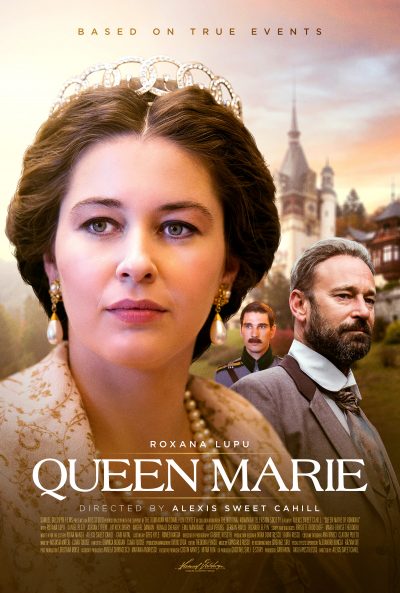
The realization of a vision can be one of the most rewarding experiences of life. Fulfilling such an undertaking may be challenging, but, if we’re true to ourselves as we move through the process, we’re likely to find it eminently satisfying and often on many levels, both for ourselves and those who stand to benefit from our efforts. So it was for a determined monarch who helped bring about dramatic changes in her country in the wake of a devastating conflict, as seen in the new Romanian historical drama, “Queen Marie.”
In 1916, two years after the start of World War I, previously neutral Romania entered the conflict on the side of the Allied Forces of France, Russia and the United Kingdom, which were later joined by the United States. It was believed that this move would help to give the country some protection against the advances of German, Austro-Hungarian and Ottoman forces. It was also thought that this affiliation would help to unify ethnic Romanians, whose population was spread out across the adjacent lands of Bukovina, Bessarabia, Transylvania, Banat, Crişana and Marcmureş, an initiative that might eventually lead to the creation of “Greater Romania.”
However, in 1917, in the wake of the overthrow of the ruling Romanov family and the unleashing of the Bolshevik Revolution, the Russians withdrew from the war, leaving Romania virtually defenseless against advancing German troops. This development led to the deaths of many Romanian soldiers and civilians and forced the war-torn nation to negotiate an unpopular peace treaty with Germany, a desperate diplomatic effort that the country’s leadership believed might help it buy some time in the waning days of the conflict. And, by the time the war ended in 1918, Romania never signed the treaty with the vanquished Germans.
In 1919, as peace talks formally ending the war began in Paris, Romania was considered one of the victors and sent a delegation to the conference to represent its interests. In addition to seeking aid relief for the nation’s citizenry, the country also pled its case to establish the aforementioned Greater Romania as the map of Europe was being redrawn. Romanian interests were advanced by Prime Minister Ion Brătianu (Adrian Titieni), but his arguments were largely ignored by the conference’s indifferent lead negotiators, British Prime Minister David Lloyd George (Richard Elfyn), French Prime Minister George Clemenceau (Ronald Chenery) and American President Woodrow Wilson (Patrick Drury). And, when Minister Brătianu reported back to Romania’s King Ferdinand (Daniel Plier), it became apparent that a different approach would have to be considered if the country’s aims were to be furthered and addressed.
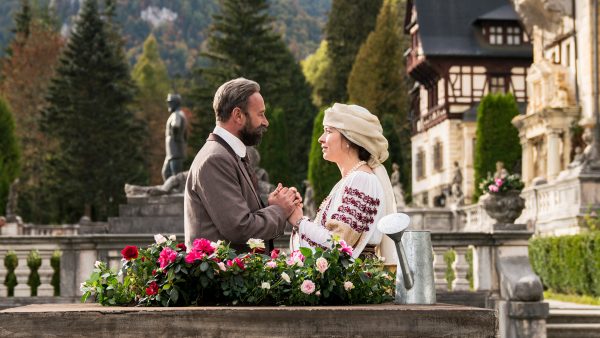
The French minister to Romania, Count de Saint-Aulaire (Philippe Corait), suggested changing or augmenting the country’s delegation to get the attention of the conference’s leadership. The first name that came to mind was the charming and eminently popular Queen Marie (Roxana Lupu), a compassionate humanitarian who worked tirelessly to support her people during and after the war. The Queen was not to become actively involved in negotiations given that Romania, like many other European nations, was a constitutional monarchy in which diplomatic matters were addressed by politicians and not the ruling royalty. However, monarchs like Queen Marie were not without influence, and, considering her reputation, she was seen as a tactful yet forthright representative for her people.
Marie was seen as the logical choice for several reasons. She was well-liked by many, especially those who benefitted from her kindness and compassion during and after the war. She volunteered to serve as a nurse in field hospitals during the conflict. After the war, she personally oversaw the delivery of food and supplies to those in need. And, as a witness to the plight of the suffering, she became a vocal advocate to secure more supplies. What’s more, given her strength of character and willingness to fight for the needy, she became an unofficial but nevertheless charismatic symbol of the emerging women’s rights movement, not just in Romania, but internationally, one who could stand toe to toe with her supposedly unshakable male counterparts.

Marie was also chosen in part because of her heritage. As the granddaughter of Queen Victoria, the English-born monarch was well-acquainted with Europe’s elite power brokers and the ways of court diplomacy. Given this royal status, she had family ties to the crown heads of the continent, such as her cousin, England’s King George V (Nicholas Boulton). This background and her blood ties thus helped to bolster her image as a refined and formidable woman of power and not just the consort of a head of state from some obscure European cultural backwater. This pedigree, it was thought, might enable her to call in favors, if needed, with the ruling elite of other more highly placed participants in the peace talks.
On top of these attributes, Marie was skillful in courting the support of valuable allies who could help to effectuate deals and concessions behind the scenes. This was particularly true of her relationship with Canadian-born adventurer Joseph Boyle (Robert Cavanah), who would later become an entrepreneur in England with ties to highly placed officials in government. He would subsequently become a trusted advisor to the Romanian government, as well as a confidante to Queen Marie. She came to value his advice and never hesitated to draw upon his influence in furthering her causes.
Still, even with these assets in her favor, Marie had doubts about her ability to succeed in her mission to Paris, partly because her role wasn’t clearly defined. The King cautioned her not to unduly interfere in the work of the country’s official delegation, urging her not to “improvise” when it came to her efforts. What’s more, though, Marie was unsure of her ability to pull off this assignment in light of the difficulties she was experiencing inside her own family. She pondered how she could manage the affairs of state when she couldn’t even manage affairs within her own family. She was most concerned about the contentious relationship that existed between her and Ferdinand with their eldest son, Prince Carol II (Anghel Damian), heir apparent to the Romanian throne. Carol’s “reckless” behavior troubled Marie and Ferdinand, particularly when it came to his tawdry relationship with a commoner, Zizi Lambrino (Maria Muller), whom the Prince planned to marry against his parents’ wishes. Marie became so concerned that she threatened to revoke his right of ascendancy and replace him with his younger brother, Nicolae (Adrian Damian), as heir apparent, a decision that threatened to tear the family apart.
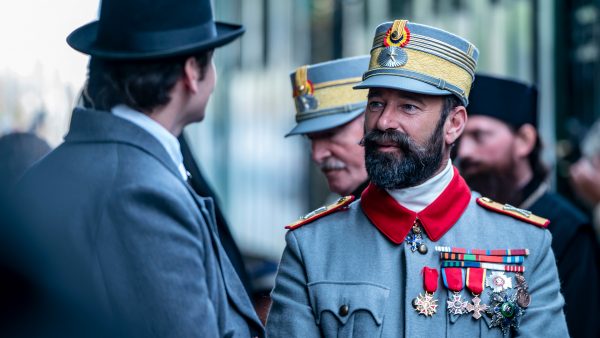
Marie had her own relationship issues as well. Her marriage to Ferdinand was largely an arranged affair; the couple barely knew one another when they wed. And, even though they had been together many years, they were often personally estranged from one another, despite their close-knit bond on matters of state. To offset this, Marie quietly engaged in an affair with Prince Barbu Stirbel of neighboring Wallachia (Emil Mandanac), a polished gentleman who often served as an informal and unofficial advisor to the Queen. This relationship appeared to be a happy one, but the marital issues with Ferdinand nonetheless remained.
Despite her doubts, Marie embarked on her journey to Paris. She was warmly received upon arrival, becoming the new toast of the City of Lights. However, when she met with Prime Minister Brătianu, she discovered that the agenda planned for her was largely ceremonial – attendance at memorial unveilings, flower shows and other such frivolous events. She could see that, if she was going to have any impact, she would have to work behind the scenes to arrange meetings with the conference’s big players. And thus she did, coordinating efforts through contacts like Joseph Boyle, King George V and American First Lady Edith Wilson (Caroline Loncq) to arrange audiences with Lloyd George, Clemenceau and President Wilson, events that proved Queen Marie was indeed no one to be trifled with. Romania’s future was on the line, and Marie was not willing to see her efforts go for naught.
When a crucial need emerges and requires fulfillment, it’s inspiring and comforting to see individuals who are willing to step forward to address them. That’s particularly true when the need is great and affects many who aren’t able to effectively help themselves. The leadership exhibited by such dynamic and courageous souls can work wonders, attaining results thought impossible. So it was with Queen Marie. She saw what was needed and made it happen.
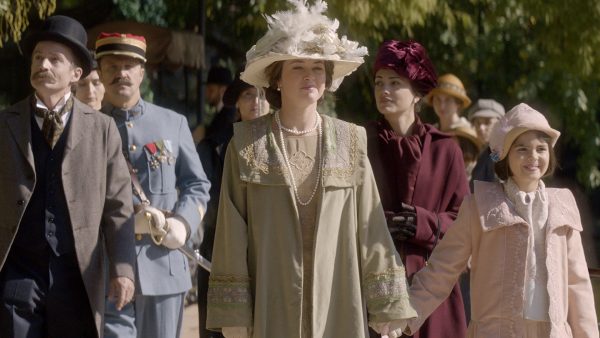
While it’s true that the monarch had many resources at her disposal to assist her in her efforts, none of what she accomplished would have happened were it not for her vision, specifically her belief in the notion that her sought-after goals could be attained. She had tremendous faith in her convictions based on thoughts, beliefs and intents that were firmly grounded in her consciousness, the principal driving force in the conscious creation process, the philosophy that maintains we manifest the reality we experience through the power of these intangible tools. And, even if she never heard of this philosophy, based on her track record, she obviously developed quite a mastery over its principles and what they could achieve.
Marie’s success was driven in large part by the fact that her beliefs were heavily infused with her personal strength of character, her sense of integrity and her authentic self. When our intentions are characterized by these qualities, it galvanizes their potency and staunchly imbues their authenticity. That’s quite a winning combination, especially when the tasks at hand represent Herculean undertakings. It’s perhaps best seen in the success of her humanitarian ventures, accomplishments wrought from her inherent sense of profound compassion. Indeed, the emergence of her true self won the day.
In bringing about these results, Marie employed a number of conscious creation principles and practices to see her vision fulfilled. For instance, she was willing to make use of multiple resources and tactics, particularly when conventional means didn’t hold much promise. Such creative thinking helped open doors that might have been otherwise remained locked tight. She looked past the limitations that blocked her path and routinely became innovative in her methods to get her way. It was an approach that worked exceedingly well.
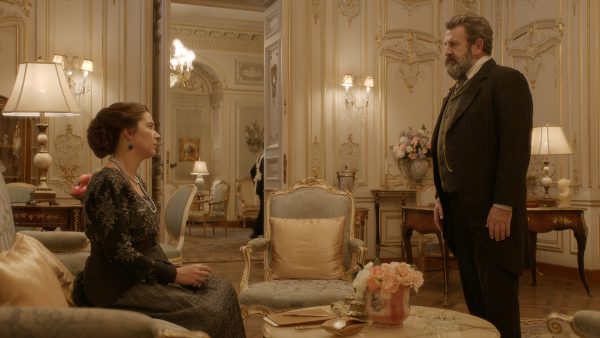
Marie also understood the power of connection, tapping contacts and relationships – some of them less than obvious – in making her case and finding her way to those who could be of the greatest help. Because everything in our existence is fundamentally interwoven, the ties that intrinsically bind all of those elements can’t be ignored. In fact, when approached with the right frame of mind, they can be accessed to great advantage in realizing the reality we seek to forge. Marie’s relationship with Joe Boyle, for example, helped her secure the ear of her English cousin King George V, who, in turn, leaned on a previously indifferent Prime Minister Lloyd George to urge him to give attention to Romanian interests. Similar results came from Marie’s relationship with First Lady Edith Wilson, who helped facilitate a meeting with her husband Woodrow, an often-reclusive participant in the peace talks who was previously reluctant to give Marie the time of day. And, once she made those connections, she made the most of the opportunity to exert her influence and to tap into theirs.
In tackling these tasks, Marie faced a significant personal challenge to overcome, namely, her doubts about her ability to accomplish what she set out to do. As conscious creation practitioners are well aware, doubt can significantly undercut our manifestation efforts, preventing our hoped-for creations from materializing, and Marie had concerns in this area. Her uncertainty was driven by the turmoil in her family life and her frustration in achieving what she sought, most notably in her relationships with Princes Carol and Nicolae. She was troubled by Carol’s rampant irresponsibility, afraid that he would bring shame on the royal family, potentially damaging its relationship with Romanian citizens. She was also hurt by Nicolae’s staunch unwillingness to step into the role of replacement heir apparent if needed, preferring instead to formally eschew his royal obligation and remain in England where he was attending university. However, she knew if she was going to succeed on her mission to Paris, she would have to set such thoughts aside and keep doubt at bay, preventing it from interfering with her other plans.
The Queen’s myriad accomplishments, from humanitarian efforts to European political maneuvering, speak volumes about her aptitude in conscious creation efforts. It’s as if she were living out her destiny, practicing her own form of value fulfillment, being her best, truest self for the betterment of herself and those around her. Considering what the Romanian people had been through during and after the war, not to mention the new threat posed by the Bolsheviks on the country’s northern border, she significantly helped strengthen the country’s position in the new Europe. That represents quite a determined and dedicated effort, especially since she was working tirelessly for the future and well-being of a nation that wasn’t even her native homeland. When one considers the lengths she went to in serving her people, she obviously epitomized the principles she championed, making them real and not just engaging in political hot air.
While some elements of this somewhat complex story are admittedly a little underdeveloped, as are the nature and background of some of the film’s supporting characters, director Alexis Sweet Cahill’s latest nevertheless provides intriguing insights into a little-known historical saga and the life of a formidable humanitarian. The superb lead performance by Roxana Lupu as the storied sovereign and the picture’s impeccable period piece production values make for an engaging watch, even for those who might not usually find such tales particularly captivating. On balance, this offering is indeed one fit for a queen. The film is available for streaming online.
When many of us think about royalty, the image that often comes to mind has to do with capricious, aloof, self-absorbed individuals who indulge decadent whims to suit their personal desires. And, in some instances, that might very much be the case. But, as this film shows, not all monarchs are cut from the same velvet robes. Some, like Queen Marie, aren’t afraid to put themselves on the line for their people, rolling up their sleeves and getting down to the work of looking after their subjects’ welfare. We could use more leadership like that these days, and this film provides us with an excellent role example, someone who is capable of truly crowning achievements.
Copyright © 2021, by Brent Marchant. All rights reserved.

No comments:
Post a Comment